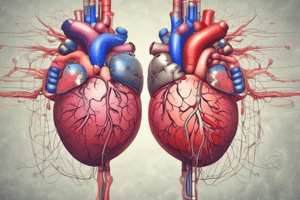Podcast
Questions and Answers
What is the study of the interactions between drugs and biological systems?
What is the study of the interactions between drugs and biological systems?
- Pharmacodynamics
- Pharmacology (correct)
- Toxicology
- Pharmacokinetics
What is the process by which a drug is broken down or transformed into a more water-soluble form?
What is the process by which a drug is broken down or transformed into a more water-soluble form?
- Distribution
- Absorption
- Excretion
- Metabolism (correct)
What is the interaction between two or more drugs that increases their effect?
What is the interaction between two or more drugs that increases their effect?
- Additive Effect
- Potentiation
- Synergism (correct)
- Antagonism
What is the measure of the fraction of a dose that reaches the bloodstream?
What is the measure of the fraction of a dose that reaches the bloodstream?
What is the process by which a drug binds to a specific receptor on a cell surface?
What is the process by which a drug binds to a specific receptor on a cell surface?
What is the process by which the US Food and Drug Administration grants approval for a drug to be marketed and sold?
What is the process by which the US Food and Drug Administration grants approval for a drug to be marketed and sold?
Flashcards are hidden until you start studying
Study Notes
What is Pharmacology?
- Study of the effects of drugs on living organisms
- Examines the interactions between drugs and biological systems
- Includes the study of pharmacokinetics (what the body does to the drug) and pharmacodynamics (what the drug does to the body)
Types of Pharmacology
- Clinical Pharmacology: study of drugs in humans, focusing on therapeutic effects and side effects
- Experimental Pharmacology: study of drugs in laboratory settings, focusing on mechanisms of action and pharmacological effects
- Molecular Pharmacology: study of the molecular mechanisms of drug action
- Toxicology: study of the adverse effects of drugs and other substances
Pharmacokinetics
- Absorption: process by which a drug enters the bloodstream
- Distribution: movement of a drug throughout the body
- Metabolism: process by which a drug is broken down or transformed into a more water-soluble form
- Excretion: process by which a drug is eliminated from the body
Pharmacodynamics
- Receptor Binding: binding of a drug to a specific receptor on a cell surface
- Signal Transduction: process by which a drug-receptor interaction triggers a response in the cell
- Dose-Response Relationship: relationship between the dose of a drug and its effect on the body
- Potency: measure of the concentration of a drug required to produce a specific effect
- Efficacy: measure of the maximum effect of a drug
Drug Interactions
- Synergism: interaction between two or more drugs that increases their effect
- Antagonism: interaction between two or more drugs that decreases their effect
- Additive Effect: interaction between two or more drugs that produces a combined effect equal to the sum of their individual effects
Drug Development and Approval
- Preclinical Trials: testing of drugs in laboratory settings and animal models
- Clinical Trials: testing of drugs in human subjects
- FDA Approval: process by which the US Food and Drug Administration grants approval for a drug to be marketed and sold
Other Key Concepts
- Bioavailability: measure of the fraction of a dose that reaches the bloodstream
- Half-Life: time required for the concentration of a drug to decrease by half
- Therapeutic Index: measure of the safety of a drug, calculated by dividing the toxic dose by the therapeutic dose
What is Pharmacology?
- Study of the effects of drugs on living organisms, examining interactions between drugs and biological systems
- Includes pharmacokinetics (what the body does to the drug) and pharmacodynamics (what the drug does to the body)
Types of Pharmacology
- Clinical Pharmacology: study of drugs in humans, focusing on therapeutic effects and side effects
- Experimental Pharmacology: study of drugs in laboratory settings, focusing on mechanisms of action and pharmacological effects
- Molecular Pharmacology: study of the molecular mechanisms of drug action
- Toxicology: study of the adverse effects of drugs and other substances
Pharmacokinetics
- Absorption: process by which a drug enters the bloodstream
- Distribution: movement of a drug throughout the body
- Metabolism: process by which a drug is broken down or transformed into a more water-soluble form
- Excretion: process by which a drug is eliminated from the body
Pharmacodynamics
- Receptor Binding: binding of a drug to a specific receptor on a cell surface
- Signal Transduction: process by which a drug-receptor interaction triggers a response in the cell
- Dose-Response Relationship: relationship between the dose of a drug and its effect on the body
- Potency: measure of the concentration of a drug required to produce a specific effect
- Efficacy: measure of the maximum effect of a drug
Drug Interactions
- Synergism: interaction between two or more drugs that increases their effect
- Antagonism: interaction between two or more drugs that decreases their effect
- Additive Effect: interaction between two or more drugs that produces a combined effect equal to the sum of their individual effects
Drug Development and Approval
- Preclinical Trials: testing of drugs in laboratory settings and animal models
- Clinical Trials: testing of drugs in human subjects
- FDA Approval: process by which the US Food and Drug Administration grants approval for a drug to be marketed and sold
Other Key Concepts
- Bioavailability: measure of the fraction of a dose that reaches the bloodstream
- Half-Life: time required for the concentration of a drug to decrease by half
- Therapeutic Index: measure of the safety of a drug, calculated by dividing the toxic dose by the therapeutic dose
Studying That Suits You
Use AI to generate personalized quizzes and flashcards to suit your learning preferences.




